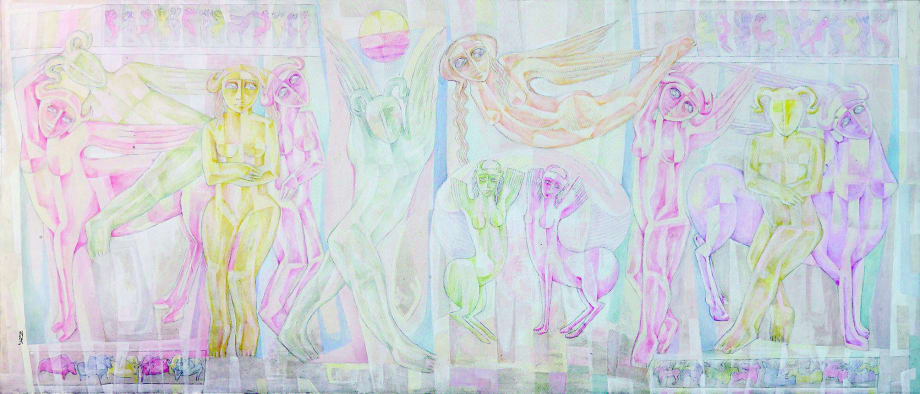Ayyam Gallery is pleased to present a retrospective exhibition with the works of Syrian artist, Leila Nseir.
This retrospective, an homage to Leila following her passing, honors Leila’s legacy and celebrates her contributions to art and feminism. We extend our deepest gratitude to The Samawi Collection and the Barjeel Foundation for their generous support in loaning their impactful pieces. We would also like to thank Ahmad Kasha, and every contributor and lender who helped put this exhibition together.
About the Exhibition
“Being a woman is my core, but femininity is not.” – Leila Nseir
Historically, women have been both subjects and creators of art, from The Venus of Willendorf to Nefertiti to Tamara De Lempicka and beyond. Reverence for female physicality alongside admiration of qualities traditionally associated with women—courage, victory, and grace—profoundly broadened and challenged prevailing narratives and norms.
Born in the core of the Middle East, Leila Nseir’s art is a vibrant testament to the rich tapestry of her culture. Her art was deeply rooted in humanist concerns and feminist thought, addressing themes of conflict, inequality, and poverty. Nseir’s career was impacted by gender persecution and patriarchal attitudes, both within her close-knit and broader communities. Nseir’s intentional reinterpretation of historical forms demonstrates a distinctive fusion of intimacy, complexity, and human suffering.
A true revolutionary, Nseir persisted through adversity. On account of social interpretations and expectations, she first let go of sculpture as it was deemed too masculine a medium. She then embarked on a long journey in painting and drawing, but faced a decline in health, due to the development of oil paint poisoning; this motivated Leila’s experimental approach. Transitioning from oils to acrylics, graphite, pastels, and eventually developing a unique monotype woodcut print technique. She continued to explore and push artistic boundaries, indicative of her resolve.
Her embrace of Istoria and the use of figure composition to convey a narrative is unwavering. Nseir’s later pieces delve into the complexities of diaspora, migration, and the interplay between tradition and modernity, by being a voice that amplified women’s stories. Nseir depicted females as a mirror, reflecting Syria and its embodiment of strength, complexity, and intricacy. Istoria is more than an exhibition; it is a dialogue between past and present, tradition and transformation. Through her evocative use of color, form, and narrative, Leila invites us to reflect on the enduring power of heritage and the ongoing quest for self-expression. Her twisted and contorted figures express both the intimacy of personal experience and the complexity of cultural identity. Nseir’s female subjects transcend traditional genre and narrative boundaries and question gender conventions and the status of women in Arab society. Nseir’s decision to leave her artworks untitled and undated stemmed from her belief that their themes were omnipresent, universal, and timeless, thus inviting a greater field of interpretation. Influenced by ancient art forms, including Mesopotamian and Egyptian, her oeuvre thus captures the essence of a cultural flux.
Thank you for joining us in celebrating the artistry and impact of Leila, whose work continues to inspire and challenge perceptions.

